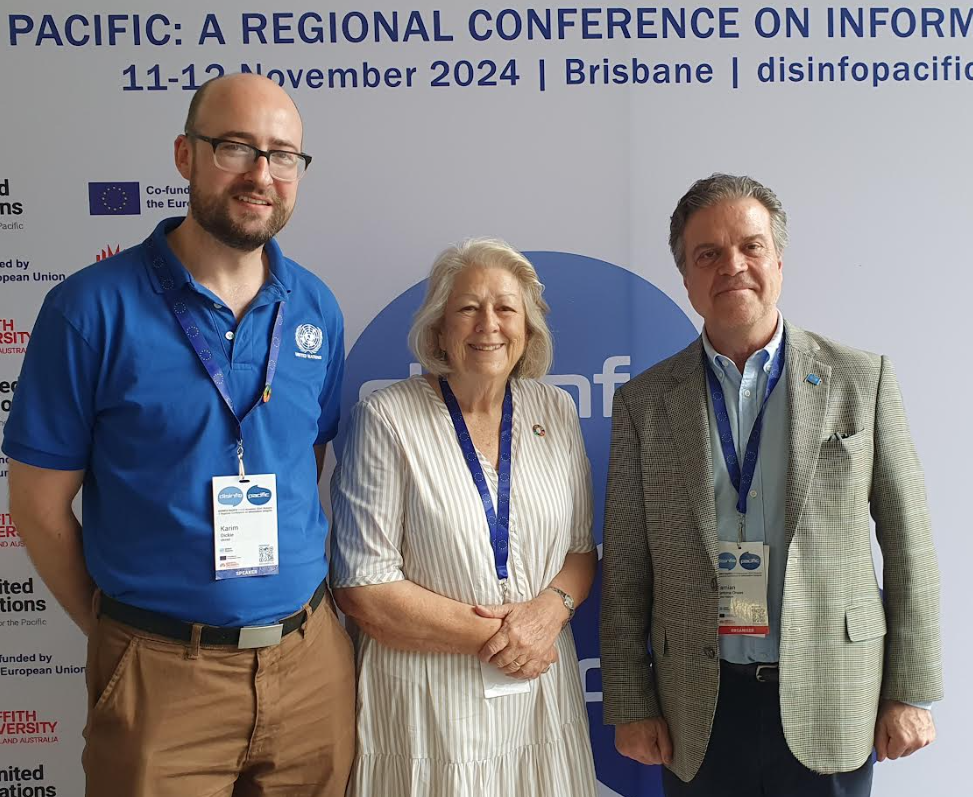COMMENT: How can we avoid mis and disinformation? What is information integrity?
29 November 2024
Joy Dunsheath MNZM, Executive Member of the United Nations Association of New Zealand (UNANZ) and Vice Chair of the World Federation of United Nations Associations (WFUNA), reports on her attendance at DisInfo Pacific, a regional conference on information integrity held in Brisbane, Australia.
--
The DisInfo Pacific Regional Conference on Disinformation Australia, New Zealand and the Pacific was held in Brisbane from 11 to 12 November 2024. Disinformation impacts democratic processes, social cohesion, climate action and public health. The Pacific region, like the rest of the world, is increasingly exposed – and will remain vulnerable to escalating threats from disinformation. Damian Cardona Onses, Director of the United Nations Information Centre for Australia, New Zealand and the South Pacific (UNIC), organised the conference and engaged with key partners, the European Union (delegations to Australia, the Pacific, Papua New Guinea) and Griffith University who co-funded the conference.
The purpose was to raise awareness, provide collaboration and address current challenges and proactively navigate the complexities of disinformation, targeting present and future generations. The conference achieved its aims ending, for me, on an optimistic note. It provided informed speakers, case studies, networking, keynote addresses, panels of expert speakers from Pacific, Australia and globally, university students, and interactive session such as the one facilitated by Karim Dickie, UNA NZ President, on Democracy and Elections.
The keynote speech on Day 1 was given by Melissa Fleming, Under Secretary General for Global Communications, UN on Creating a more Humane Information Ecosystem. On Day 2 the keynote speech was by The Hon Tanya Plibersek MP – Minister for the Environment and Water of Australia. Each of the two-day conference was packed with useful information.
Addressing misinformation and disinformation requires a multifaceted approach. Education is paramount; individuals must be taught critical thinking skills to analyse and question the sources of their information. Equally important is the role of technology companies in monitoring and flagging false information while upholding freedom of speech. Governments and organizations should work together to promote transparency and accountability in the dissemination of information.
One Session I attended was Prebunking Disinformation: Next Generation Workshop. It was organised by Afreeda Germean, Lachlan Ulyett and McKenzie Mulligan, along with Samantha Iyar, a journalist from Palau. One exercise was uploading on to social media false news (an experiment which was removed from the web with in about 8 minutes). It was fictitious, fabricated by us, as were the hashtags. Within a few minutes there were comments and before the fabricated item was deleted almost 5000 people had viewed it, given it a “like” and some made comments. Did they ensure that the data was accurate? reliable?
How do you define something as truth? What is truth? Information integrity is the practice of ensuring that data is accurate, reliable, and trustworthy. We were given strategies on how to verify the authenticity of sources, maintain data quality, and correct any inaccuracies. I left the conference with the understanding that by prioritising information integrity, we can build a more informed and resilient society, capable of discerning truth from falsehood, spot deep fakes and combat disinformation. One useful source is: Overview | UN INFO Help Center


